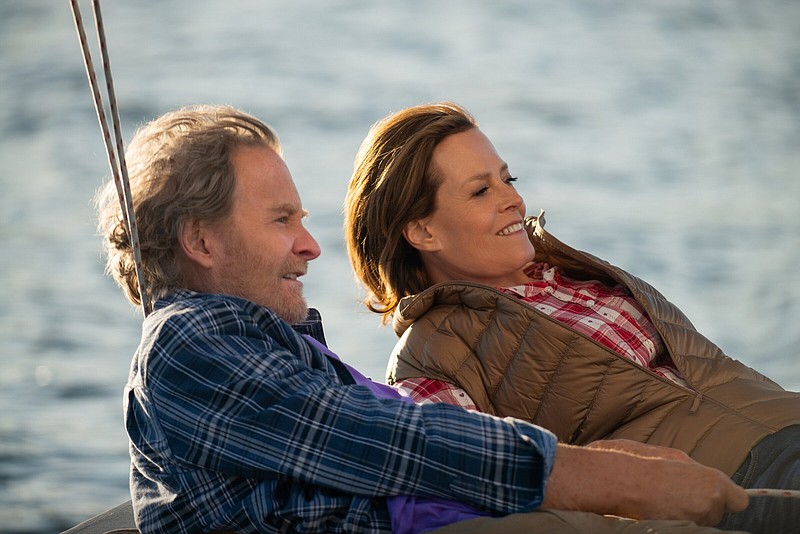Sigourney Weaver stars and anchors "The Good House," a smart and thoughtful new drama aimed at grownups from co-directors Maya Forbes and Wally Wolodarsky. The film is adapted from the bestselling 2013 novel of the same name by Ann Leary. It proves to be a wonderful vehicle for Weaver who (inexplicably) hasn't been given a role this meaty in a long time. Watching her navigate between comically sardonic and tragically damaged is a treat.
"The Good House" isn't an easy movie to map out, and it ends in a much different place from where it begins narratively, thematically and tonally. To Forbes and Wolodarsky's credit, they do a good job ushering us through their wonky story, keeping us focused and laying enough groundwork that the inevitable final act, though a little shaky, feels earned. It's also helped by a collection of interesting and organic supporting characters who liven things up and fill out the film's cozy small town setting.
The movie starts by planting our feet in Wendover, Mass., a picturesque little town on the North Shore of Boston. It's a quaint and quiet community with an inviting atmosphere and postcard quality views. It's where me meet Hildy Good (Weaver), a hometown real estate agent with confidence to spare. Hildy is all about perception, dressing to the nines and driving a Range Rover just to convey the image of success to her clients. And Hildy is accustomed to success, that is until recently. Let's just say she has hit a rough patch.
"The Good House" is all about unpacking Hildy's story and much of it is done through her own words to us. Weaver routinely breaks the fourth wall, speaking directly to the audience and establishing herself as our unreliable narrator. But her straight-to-camera dialogue is more than some gimmicky narrative device. It's a key ingredient to the movie. At times it comes across as Hildy simply sharing her story through her own biased and self-deluded lens. Other times it comes across as a woman wrestling with her conscience; trying to convince it (us) and herself that she's fine. Some of the most revealing moments come through these brief one-on-ones.
Though she's not ready to admit it, Hildy's life is crumbling. The souring housing market has hurt her business, leaving her with mounting debt. She has to pay alimony to her ex-husband Scott (David Rasche) who left her for a man. Her two adult daughters Tess and Emily (Rebecca Henderson, Molly Brown) have their own lives yet still sponge off mom. Her once trusted protege Wendy (Kathryn Erbe) stole most of her clients and started her own realty agency. And to top it all off, Hildy's an alcoholic. She has duped her family into believing she's in recovery following an intervention and a rehab stint. But while she plays sober during the day, at night she guzzles wine from her hidden stash at home.
Of course she think she's OK, but Hildy lives in denial. "I need a good year," she tells us, as if selling more houses will solve all of her problems and help get her mojo back. She's pretty convincing, and we're tempted to give her the benefit of the doubt. That's because both Weaver and the cagey script (penned by Forbes, Wolodarsky and Thomas Bezucha) imbue Hildy with such a persuasive self-assurance, especially in the film's first half. But we learn better over time as the cracks in her facade become more noticeable.
The colorful array of townsfolk weave in and out of the story, each used to reveal a little more about Hildy. In addition to her daughters, ex-husband, and arch reality rival, there's also the town's therapist, Peter (comedian Rob Delaney), a wealthy young newcomer, Rebecca (a terrific Morena Baccarin), her perpetually soused old friend, Mamie (Beverly D'Angelo), and the local coffee shop gossip, Henry (Paul Guilfoyle).
Out of the slew of side characters, the most alluring is Frank Getchell (Kevin Kline). He's the local jack of all trades who happens to be Hildy's old high school flame. He's a bit kooky, but he's also an all-around good guy who still cares for Hildy. It's a nice reunion for Weaver and Kline who worked together in two movies during the 1990s, "Dave" and the excellent "The Ice Storm." From their first scene together, the two screen veterans instantly rekindle their old chemistry. And while Kline doesn't get nearly as much screen time as I had hoped, he doesn't waste a moment he was given. And when together with Weaver, the two have an undeniable spark.
"The Good House" offers something that has become a rarity in modern movies -- an actual look at womanhood that's free of pity and sentimentality. It's even more rare for its subject to be an older woman -- a demographic that Hollywood repeatedly overlooks. But "The Good House" proves what many of us have known -- that there are plenty of good stories to tell from this age group. And there are plenty of good actors who still have a lot to bring to the screen. In this case it's Sigourney Weaver, who not only proves that point, but who delivers some of the best work of her already stellar career.
